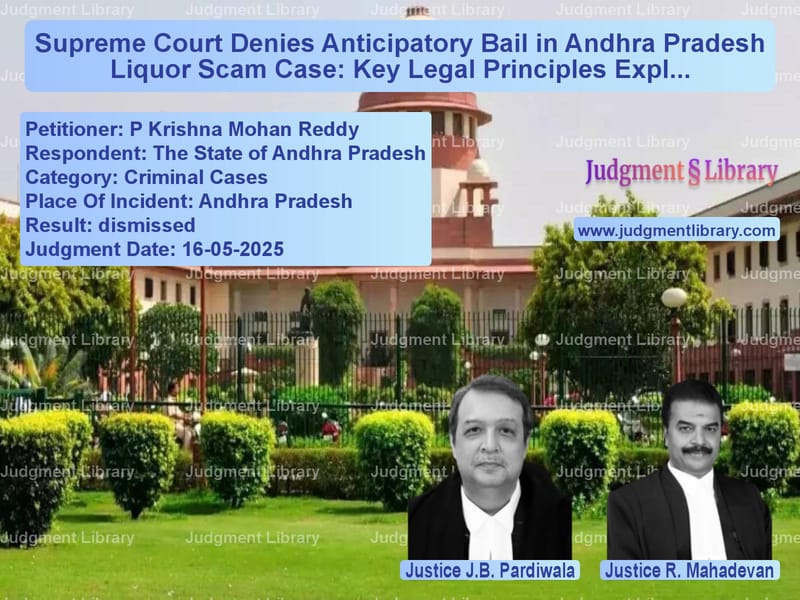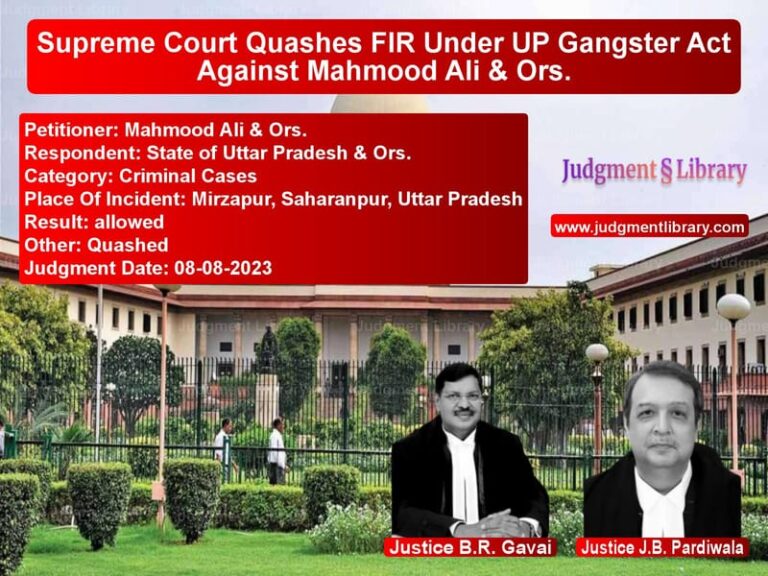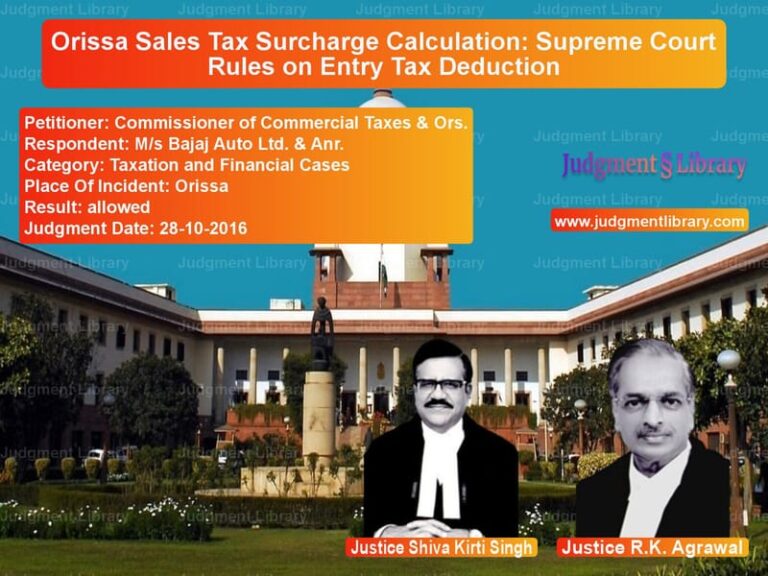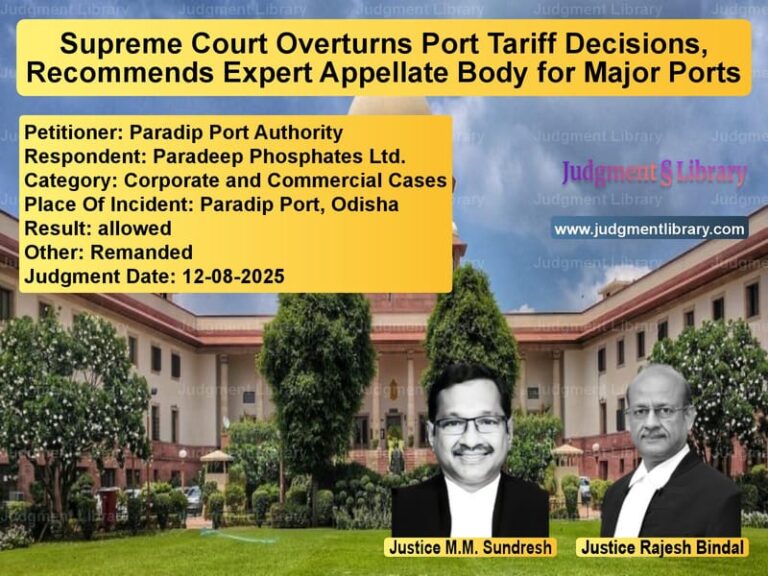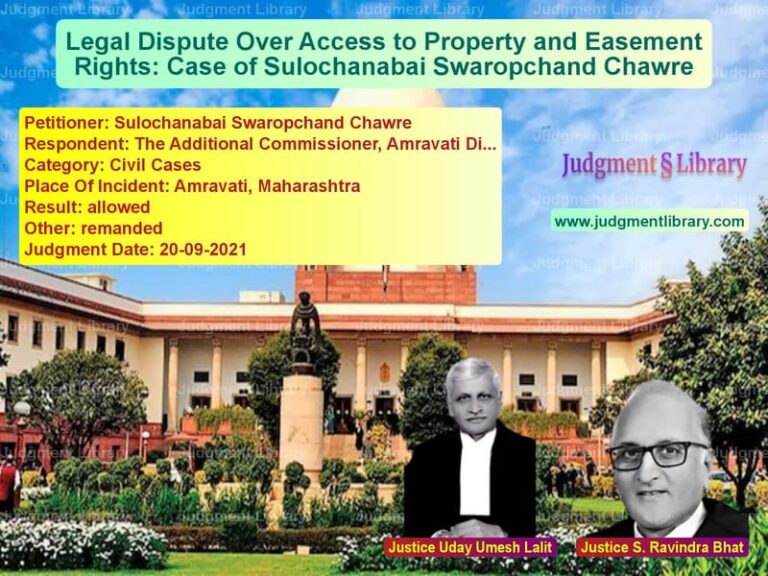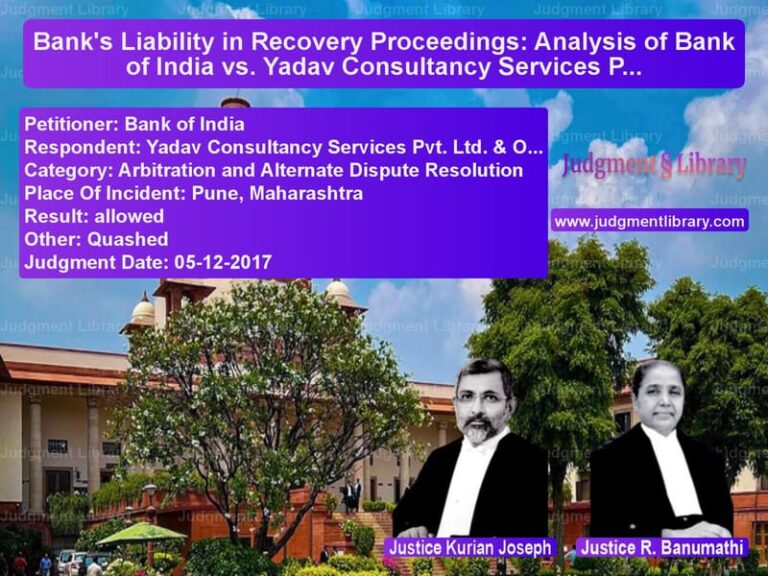Supreme Court Denies Anticipatory Bail in Andhra Pradesh Liquor Scam Case: Key Legal Principles Explained
In a significant ruling that clarifies crucial legal principles regarding anticipatory bail and the admissibility of confessional statements, the Supreme Court has denied pre-arrest bail to former public servants accused in a massive liquor scam case from Andhra Pradesh. The case involving P Krishna Mohan Reddy and others accused of corruption in the state’s excise policy has brought to light important legal questions about when courts should grant protection from arrest and what evidence can be considered at the bail stage.
The petitioners, former public servants who had retired from service, approached the Supreme Court seeking anticipatory bail after the Andhra Pradesh High Court denied them protection from arrest. They were accused in Crime No. 21 of 2024 registered at CID Police Station, Mangalagiri, for offenses including criminal conspiracy, cheating, criminal breach of trust, and various provisions of the Prevention of Corruption Act. The prosecution alleged a massive scam involving misappropriation of public funds to the tune of over Rs. 3,000 crores through manipulation of the state’s liquor distribution policy.
The petitioners, represented by senior counsel Dr. Abhishek Manu Singhvi and Mr. Vikas Singh, made several key arguments in their favor. They contended that “their clients at the relevant point of time were holding public office. They were public servants. They have retired from service. However, due to political vendetta and bias, they have been arrayed in the alleged crime on the allegations that they are a part and parcel of a well-hatched criminal conspiracy.” They further argued that “there is no prima facie case worth the name against the petitioners” and that they had been fully cooperating with the investigation.
The State of Andhra Pradesh, represented by senior counsel Mr. Mukul Rohatgi, Mr. Siddharth Luthra, and Mr. Siddharth Aggarwal, vehemently opposed the grant of anticipatory bail. They argued that “there is more than a prima facie case against the petitioners. The investigation is at a very crucial stage. According to the State, there has been misappropriation of public exchequer to the tune to more than Rs.3,000 Crore.” The State also expressed concern that “granting anticipatory bail to the petitioners could potentially hinder the ongoing investigation.”
The Supreme Court, after examining the materials on record, agreed with the High Court’s decision to deny anticipatory bail. The Court noted the serious nature of allegations, observing that “custodial interrogation is qualitatively more elicitation oriented than questioning a suspect who is well ensconced with a favourable order under Section 438. In corruption cases concerning influential persons, effective interrogation of the suspect is of tremendous advantage in disinterring many useful information and also materials which are likely to be concealed.”
The Court made a significant observation about the petitioners’ argument regarding political vendetta, stating: “To some extent, the petitioners could be said to have made out a prima facie case of political bias or mala fides but that by itself is not sufficient to grant anticipatory bail overlooking the other prima facie materials on record.” The Court elaborated that “political vendetta or bias if any is one of the relevant considerations while considering the plea of anticipatory bail. The courts should keep one thing in mind, more particularly, while considering the plea of anticipatory bail that when two groups of rival political parties are at war which may ultimately lead to litigations, more particularly, criminal prosecutions there is bound to be some element of political bias or vendetta involved in the same.”
One of the most important legal aspects addressed in this judgment concerns the admissibility of confessional statements of co-accused at the bail stage. The High Court had relied on such statements, observing that they could be considered under Section 30 of the Indian Evidence Act. However, the Supreme Court strongly disagreed with this approach, providing a comprehensive analysis of the legal position.
The Supreme Court held: “We are of the considered opinion that such a confession if any cannot be looked into at the stage of anticipatory bail or even regular bail.” The Court explained that “before a confession is taken into consideration against a co-accused, the said confession has to be duly proved against the maker. It has to be clearly established that such confession is not vitiated either by Section 24 of the Evidence Act nor rendered inadmissible by Section 25 thereof, which can only be ascertained in the course of trial.”
The judgment provided detailed reasoning about why confessional statements cannot be considered at the bail stage, noting that “Section 30 of Evidence Act postulates that such a confession can be taken into consideration only where the accused persons are jointly tried. The said provision does not merely require that the persons must be accused of the same offence, but rather requires that they must be being tried jointly for the said offence.” Since at the bail stage, the accused persons are not being jointly tried, Section 30 of the Evidence Act cannot be invoked.
The Court also addressed the issue of statements recorded under Section 161 of the Code of Criminal Procedure, clarifying that “a statement of an accused under Section 161 of the Cr.P.C stands on a completely different footing from a police statement of a witness.” The Court explained that if such statements are inculpatory, they are in the form of confessions or admissions and are governed by the provisions of the Evidence Act, while exculpatory statements can only be used for limited purposes.
In a significant caution to investigating agencies, the Court stated: “We would also like to make ourselves very clear that the investigating agency shall not adopt any third-degree methods or shall not coerce or exert any undue pressure or bring any undue influence on any of the witnesses or any of the co-accused to make statements that may suit the State. Tomorrow, if any complaint is made before the court in this context with some cogent material, be it the trial Court or the High Court or the Supreme Court, the same shall be viewed very seriously.”
The Court also clarified that its decision on anticipatory bail would not prejudice the petitioners’ right to seek regular bail if arrested, stating: “It is needless to say that the principles of grant of anticipatory bail substantially differ from the principles of grant of regular bail.”
This judgment serves as an important precedent on several legal fronts. It reinforces the principle that anticipatory bail is an extraordinary remedy that should not be granted routinely, especially in cases involving serious economic offenses and corruption. The Court’s detailed analysis of Section 30 of the Evidence Act provides much-needed clarity on the limited circumstances under which confessional statements of co-accused can be considered, establishing that such statements cannot be relied upon at the bail stage.
The judgment also balances the rights of accused persons with the needs of investigation, particularly in complex cases involving white-collar crimes where documentary evidence and financial trails require thorough investigation. By denying anticipatory bail while simultaneously cautioning against investigative excesses, the Court has struck a balance between enabling effective investigation and protecting fundamental rights.
This case highlights the evolving jurisprudence around anticipatory bail in India, particularly in cases involving corruption and economic offenses. The Supreme Court’s reasoning emphasizes that while allegations of political vendetta may be relevant, they cannot override substantial evidence of wrongdoing, especially when public interest and large-scale corruption are involved.
The legal principles established in this judgment will have far-reaching implications for future cases involving anticipatory bail, particularly those concerning economic offenses and corruption. The clear demarcation of what evidence can be considered at the bail stage and the strict conditions for invoking Section 30 of the Evidence Act provide valuable guidance for lower courts dealing with similar matters.
Petitioner Name: P Krishna Mohan Reddy.Respondent Name: The State of Andhra Pradesh.Judgment By: Justice J.B. Pardiwala, Justice R. Mahadevan.Place Of Incident: Andhra Pradesh.Judgment Date: 16-05-2025.Result: dismissed.
Don’t miss out on the full details! Download the complete judgment in PDF format below and gain valuable insights instantly!
Download Judgment: p-krishna-mohan-redd-vs-the-state-of-andhra-supreme-court-of-india-judgment-dated-16-05-2025.pdf
Directly Download Judgment: Directly download this Judgment
See all petitions in Bail and Anticipatory Bail
See all petitions in Fraud and Forgery
See all petitions in Money Laundering Cases
See all petitions in Judgment by J.B. Pardiwala
See all petitions in Judgment by R. Mahadevan
See all petitions in dismissed
See all petitions in supreme court of India judgments May 2025
See all petitions in 2025 judgments
See all posts in Criminal Cases Category
See all allowed petitions in Criminal Cases Category
See all Dismissed petitions in Criminal Cases Category
See all partially allowed petitions in Criminal Cases Category

